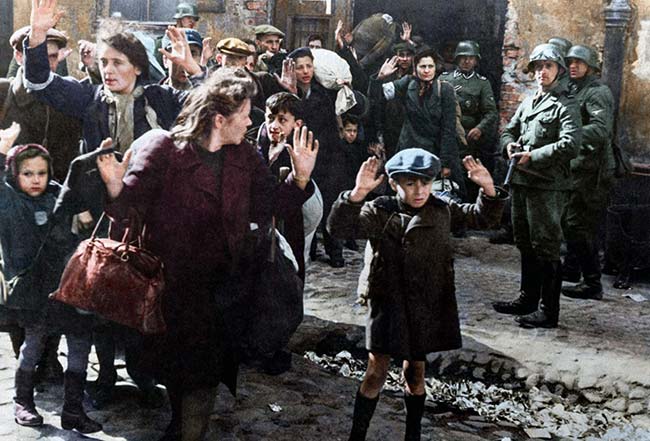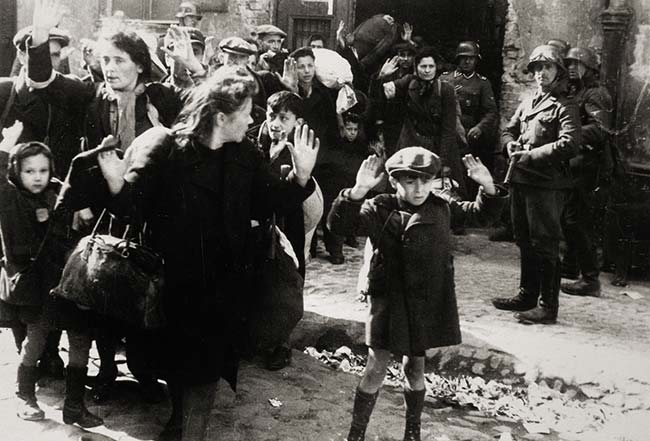Admitting Color?
On the ethos of coloring historical shots
A discussion with the art historians Peter Geimer, Wolfgang Ullrich (→ Short Bios) and Oliver Krätschmer (moderator) as part of the research project “Images of History in Contemporary Art” on:
Friday, July 14, 2023
6-8 p.m.
VENUE
Wissenschaftsetage im Bildungsforum
Am Kanal 47
14467 Potsdam
PROGRAM
Welcome and presentation of the research project “Images of History in Contemporary Art” – Melanie Franke
Introduction to the topic – Oliver Krätschmer
Panel discussion – Peter Geimer, Wolfgang Ullrich and Oliver Krätschmer (moderator)
Historically significant photographs or films are no longer inevitably black and white. This is not only because color images, which began to spread in the 1930s, are increasingly finding their way into archives as historical evidence. In addition, the digital coloring of black-and-white photographs and films seems to have taken root recently. The artist Marina Amaral and the historian Dan Jones, for example, promise a “new history” with their 2018 volume The Colour of Time, which restores “colorful brilliance to the faded past”. For the documentary They Shall Not Grow Old, for which Peter Jackson was commissioned by the Imperial War Museum to mark the centenary of the end of the First World War, footage of the Western Front was not only restored, but also given color and sound.

MARINA AMARAL, Suppression of the Warsaw Ghetto Uprising, 2018, digitally colorized photograph, © Marina Amaral.
Although the stock of historical visual material is not touched during digital colorization, it nonetheless seems to change permanently. The new colors of the photographs and films make them appear far more vivid, so that they seem to resurrect history before the eyes of the viewers. Since coloration conveys the impression of bringing the viewer closer to the pictorial event, it is said to have the potential to be conducive toward evoking the past. But long before it became technically possible to digitally post-process images, color was controversial in film and photography theory. Siegfried Krakauer, for example, regarded it as an “ingredient” that lacked any significance, and Roland Barthes even called it “palliation” that obscures the truth of photography.

FRANZ KONRAD (?), »Brought out of bunkers by force«, 1943, photograph, 18 x 24 cm, © Getty Images.
As part of the “Admitting Color?” panel discussion, Peter Geimer and Wolfgang Ullrich will address the ethical implications of colorization. At the center of the debate is the question of how to deal with archival material. Can the past only be traced from a critical distance, or is an empathetic approach indispensable in its reception? Should historical testimonies be viewed in the state in which they were handed down through history, or is it the responsibility of posterity to shape the memory of the past in a topical manner? Would it be intrusive, possibly even inappropriate, to give color to historical shots for the sake of their communicability, or is it morally almost imperative to preserve the horrors of history from fading so that the future may be better?
SHORT BIOGRAPHIES
Prof. Dr. Peter Geimer has been Professor of Modern and Contemporary Art History at Freie Universität Berlin since 2010 and took over as Director of the German Center for Art History in Paris in October 2022. His research areas include the theory and history of photography, the visual representation of the past, and the history of science. Most recently, he published the study Die Farben der Vergangenheit. Wie Geschichte zu Bildern wird in which he examines, among other things, the recoloring of historical photographs and films.
Prof. Dr. Wolfgang Ullrich was Professor of Art History and Media Theory at the Staatliche Hochschule für Gestaltung Karlsruhe from 2006 to 2015 and has since worked as a freelance author, cultural scientist and consultant. His research interests include the critique of the concept of art, the aesthetics of consumption, and phenomena in the sociology of images. Most recently, he published the essay Die Kunst nach dem Ende ihrer Autonomie, in which he argues, among other things, that the representation of history should take into account the needs of the present.
The panel discussion will be moderated by Oliver Krätschmer and organized by the research group “Images of History in Contemporary Art”, led by Prof. Dr. Melanie Franke and funded by the Swiss National Science Foundation.
The team members are: Marie Egger, Melanie Franke, Ulrike Gerhardt, Anna Leonie Grimm, Verena Kittel and Oliver Krätschmer.
PROJECT WEBSITE
www.gbgk.de
REGISTRATION
Interested parties please register with oliver.kraetschmer@uni-potsdam.de
by 11 July 2023 at the latest to participate in the panel discussion.
The number of participants is limited.
Thanks
Antje Schötz
Andrea Molz-Gerhard
With the kind support of


